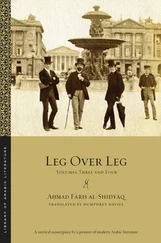516“the poet”: ʿAdī ibn Zayd al-ʿIbādī (d. ca. AD 600).
517“Objection was made that aẓāfir should not be inflected” ( fa-ʿturiḍa ʿalay-hi ṣarfu aẓāfir ): i.e., aẓāfir is normally diptote (i.e., should be read here as aẓāfira ) but in these verses has to be read as triptote ( aẓāfirin ), a bending of the rules that is permitted, as the author says, for the sake of the meter (Wright, Grammar , 2:387) and which is determined by the form of the following word, ( ẓafirat ).
518“for the sake of the paronomasia”: i.e., because aḥlas and malḥūs , while having different meanings, share the same triliteral root ( ḥ-l-s ).
519“Except for the words ‘in glory’”: tanawwarā , repeated at the end of each hemistich of the first line (“to reveal a brighter fate” and “was made depilate”), is an example of both “perfect paronomasia” (identicality of form with difference of meaning) and “antithesis” (the use of two contrasting ideas in one line); al-shiʿr (“poetry”) and al-shiʿrāʾ (“pubic hair”) are examples of near-perfect paronomasia and antithesis; mafkharā (“in glory”) stands out as neither paronomasia nor antithesis.
520“the word qaḥaba ”: this, in the unchaste or vernacular language, means “to whore.”
521“the repetitive form” ( al-takthīr ): i.e., fassā versus fasā , the former indicating repeated performance of the action indicated by the latter.
522“ ẓallām li-l-ʿabīd ”: the phrase occurs several times in the Qurʾan (e.g., Q Āl ʿImrān 3:182); ẓallām , from ẓālim , is the nominal equivalent of the verbal intensive.
523This apparently irrelevant aside may perhaps be explained by the fact that the author contracted a venereal disease while in Malta.
524“at this point”: i.e., at the thirteenth chapter of each book.
525“Hie ye to security!” ( ḥayya ilā l-falāḥ ): a phrase in the call to prayer.
526“a turban of different fashion”: in Egypt, men of different religious communities wore turbans of different colors and, sometimes, shapes (see Lane, Manners , 31).
527“pilgrims from ʿArafāt”: the gathering on Mount ʿArafāt outside of Mecca is the final rite of pilgrimage, after which the pilgrims disperse to their separate countries.
528“You are to me as my mother’s back!” ( anti ʿalayya ka-ẓahri ummī ): i.e., “intercourse with you is as forbidden to me as it is with my mother,” a pre-Islamic divorce formula; the “back” is specified rather than the belly because intercourse with a woman is likened to riding an animal (see Lane, Lexicon , s.v. ẓāhara ).
529“Your nose-rope is on the top of your hump!” ( ḥabluki ʿalā ghāribiki ): meaning “Go wherever you want” because when a she-camel that is wearing a nose-rope is sent out to graze, the rope is thrown on top of her hump, for if she can see the rope, she will not want to eat anything (al-Maydānī, Majmaʿ , 1:132); the expression is associated with divorce.
530“Return to your covert!” ( ʿūdī ilā kināsiki ): as though she were a gazelle or an oryx that had made itself a shelter against the heat.
531“(un)buckle to her will and her every demand fulfil” ( yuwāṭiʾahā ʿalay-hi wa-yujāmiʿahā ): the verbs wāṭaʾa and jāmaʿa both mean both “to agree with” and “to copulate with.”
532“legal dalliance” ( al-mutʿah ): a marriage legally contracted for a set period, usually short.
533“How many a heart has been tied to the rack… or gold coins expended” ( wa-la-kam taṣaddaʿat qulūb… wa-danānīra nuqidat ): evocative of Q Takwīr 81:1–14.
534“Verily… it is a great woe” ( innahā la-iḥdā l-kubar ): Q Muddaththir 74:35.
535“ill you answered though well you heard!” ( asaʾta jābatan baʿda an aṣabta samʿan ): a distortion of the proverb asā’a samʿan fa-asāʾa jābatan , “he answered ill because he heard ill.”
536In fact, none of the obscure words explained in this chapter occur in the preceding.
537The author uses the double entendres implicit in the terminology of grammar ( fāʿil “actor/subject of a verb”; mafʿūl “acted upon/object of a verb”; fiʿl “act/verb”; rafʿ , literally “raising,” i.e., the vowel ending — u when used to mark the nominative case; naṣb , literally “erecting,”) i.e., the vowel ending — a when used to mark the accusative case to describe sexual acts (a common conceit). The thrust of the argument laid out below is that there is no word for marriage that does not derive from other words that originally refer to something else; thus, the rites and institutions that have developed around it are historically contingent and further (2.14.5), religion’s, or the state’s, interference in what is a private contract is without justification.
538Abū l-Baqāʾ: Ayyūb ibn Mūsā Abū l-Baqāʾ al-Kaffawī (ca. 1027/1618 to ca. 1093/1682); his Kitāb al-Kulliyyāt is a dictionary.
539“noun nikāḥ ” etc.: the issue here is that this word, which is the preferred legal term for sexual congress, is regarded by some as embarrassingly direct.
540“mysterious letters” ( asrār ): letters of unknown signification that occur at the beginning of certain suras of the Qurʾan (see Watt, Bell’s Introduction , 61–65).
541“ Nūn . By the Pen and all that they write!” ( nūn wa-l-qalami wa-mā yasṭurūn ): Q Anfāl 8:1.
542 kāf-hāʾ-yāʾ-ṣād : letters occurring at the beginning of Sūrat Maryam (Q Maryam 19:1).
543 alif-lām-fāʾ : letters occurring at the beginning of Sūrat al-Baqarah (Q Baqarah 2:1).
544 ḥāʾ-mīm : letters occurring at the beginning of suras 40–46.
545“an active participle of the verb ḥ-y-y … an imperative verb formed from kāna ”: i.e., if  is written backwards the result,
is written backwards the result,  , may be broken down (ignoring short vowels) into
, may be broken down (ignoring short vowels) into  , to be understood according to the orthography used here as
, to be understood according to the orthography used here as  (“alive, quick,” an epithet of God) from
(“alive, quick,” an epithet of God) from  (or
(or  ) and
) and  (“Be!”) from
(“Be!”) from  .
.
546“the letter nūn followed by the letter kāf ”: i.e., nik , meaning “fuck!”
547“the alif and the ḥā ʾ”: i.e., āḥ , which could also be understood as the exclamation “Ah!”
548“by keeping only the end”( bi-ḥaythu yaslamu l-ṭaraf ): i.e., by removing the initial syllable nik- from nikāḥ , leaving (by re-interpretation of the remaining ductus) aḥḥ , which is an “exclamation expressing… pleasure during sexual intercourse” peculiar to women (Hinds and Badawi, Dictionary ).
Читать дальше

 is written backwards the result,
is written backwards the result,  , may be broken down (ignoring short vowels) into
, may be broken down (ignoring short vowels) into  , to be understood according to the orthography used here as
, to be understood according to the orthography used here as  (“alive, quick,” an epithet of God) from
(“alive, quick,” an epithet of God) from  (or
(or  ) and
) and  (“Be!”) from
(“Be!”) from  .
.










